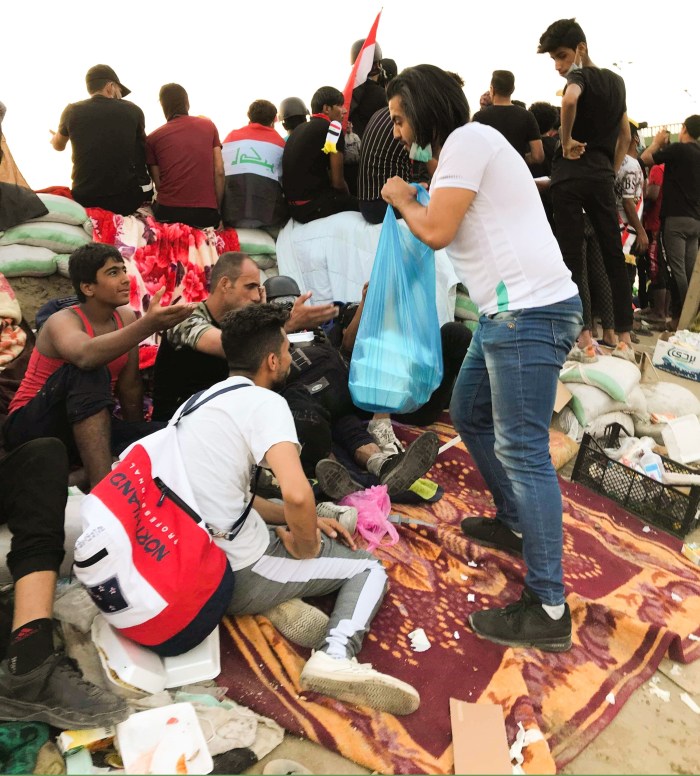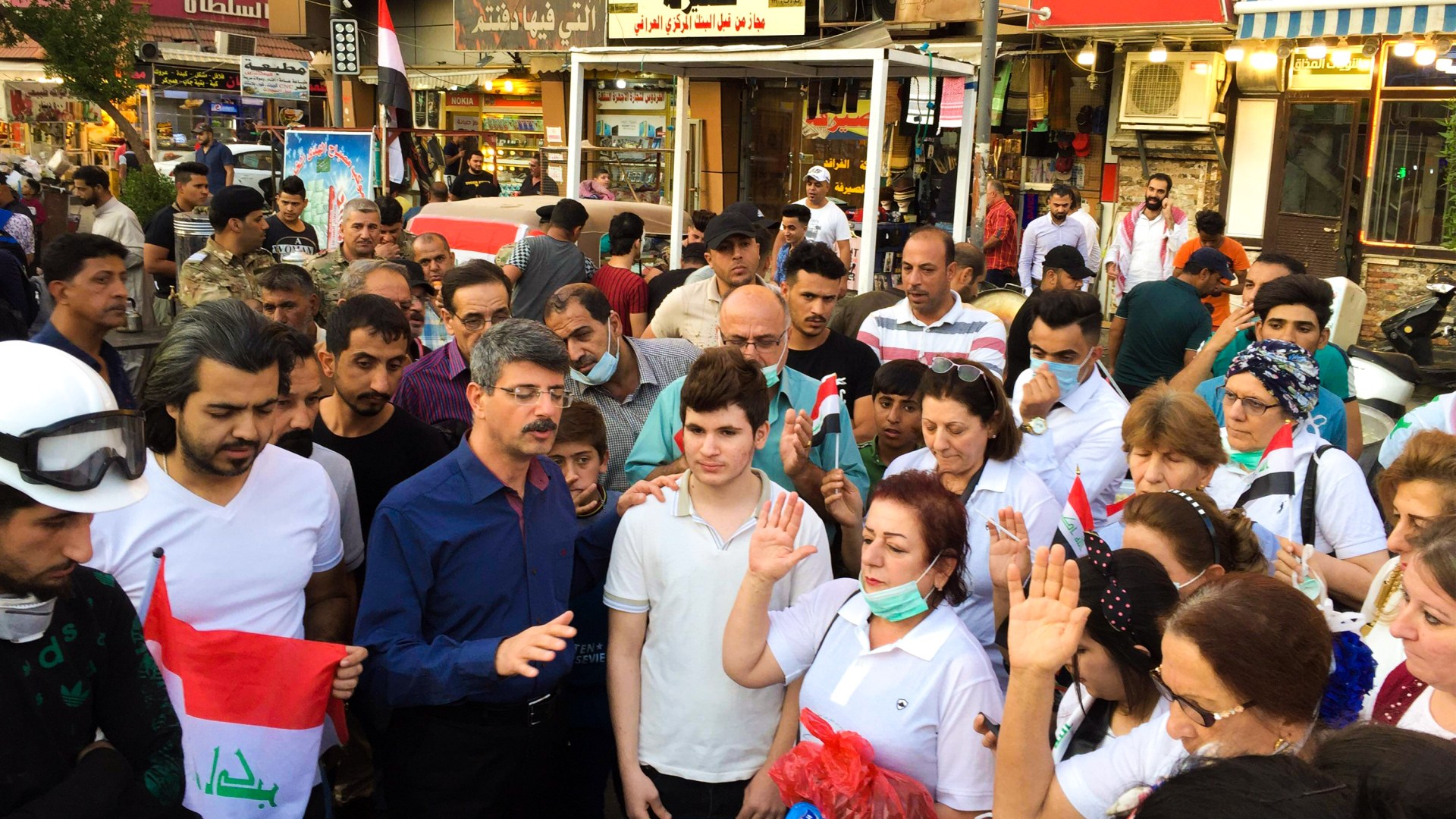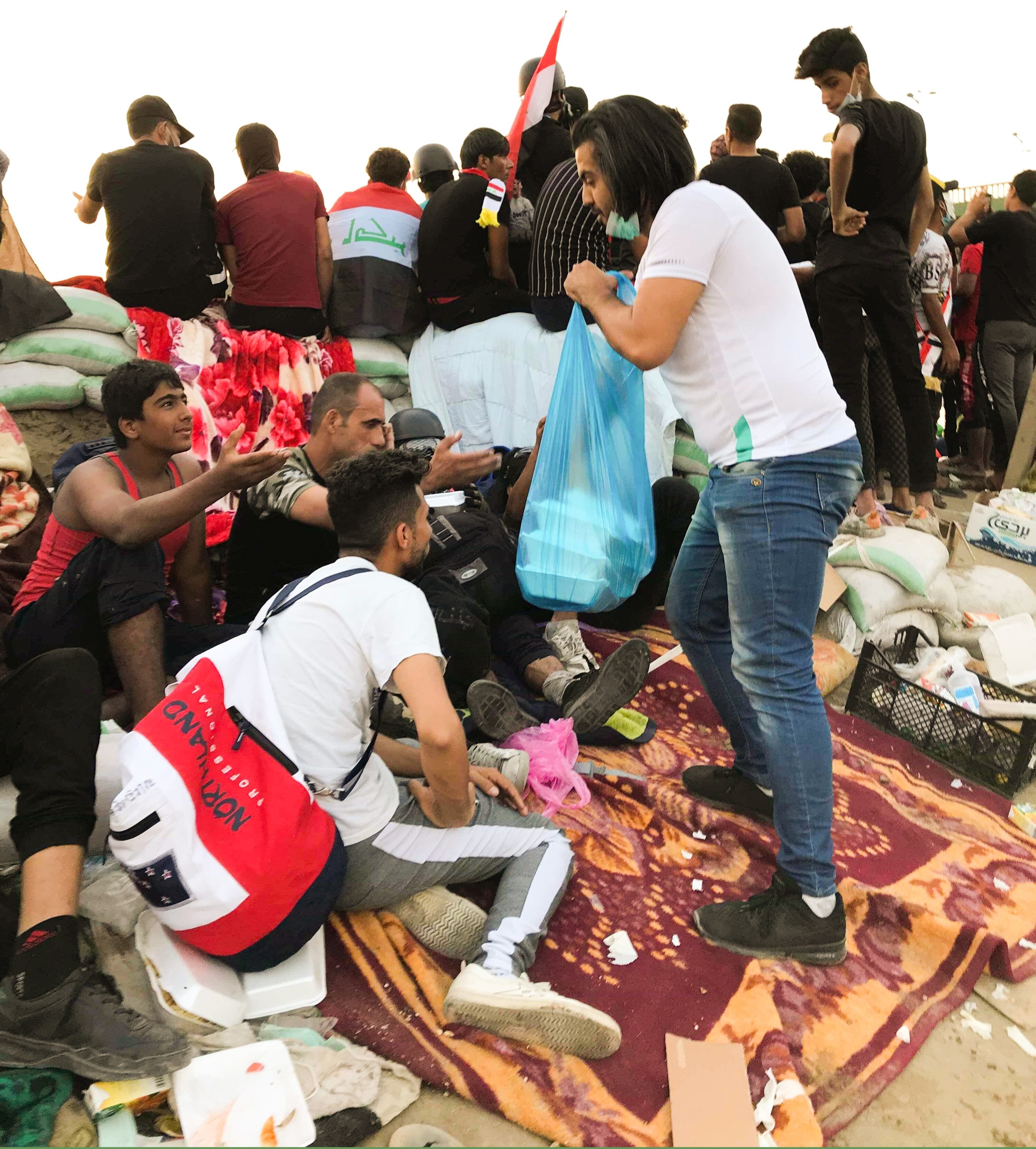Distributing food to protesters with 40 fellow church members under the Jumariyah bridge near Tahrir Square in Baghdad, Ara Badalian made a poignant observation.
“This movement is a flood, occupying the hearts of the youth and the poor, without any religious discrimination,” the pastor of National Baptist Church recalled to CT. “It has broken down all the walls that divided Iraqis.”
It is at the bridges—about a dozen span the Tigris River, which bifurcates the Iraqi capital—where most violence has taken place. The protest movement, which began in October, has resulted in more than 400 deaths, around a dozen of them security personnel. Over 17,000 people have been injured.
In response, the Chaldean Catholic Church decided last week to refrain from holding public celebrations of Christmas, trading tree decorations and holiday receptions for prayers of intercession.
“Instead of bringing hope and prosperity, the current government structure has brought continued corruption and despair,” Bashar Warda, the Chaldean archbishop of Erbil, told the United Nations Security Council last week.
“[Iraqi youth] have made it clear that they want Iraq … to be a place where all can live together as equal citizens in a country of legitimate pluralism and respect for all.”
Protesters have demanded the dissolution of parliament, widespread government reforms, and amendment of the sectarian-based 2005 constitution.
 Courtesy of National Baptist Church
Courtesy of National Baptist Church
Ratified following the United States-led 2003 Iraq War, the current constitution gives the Middle East nation’s Shiite majority (55% of the population) the leading position of prime minister, as well as the influential interior and foreign ministries.
The Sunni minority (40%) receive the speaker of parliament and the defense ministry. The Kurds, who comprise only a third of the Sunni population but are concentrated in their own autonomous northern region, receive the presidency and finance ministry.
Islam is established as the religion of the state and the foundational source of legislation. Christians are among three religious minorities guaranteed religious freedom, though the constitution protects the Islamic identity of the majority.
While the protests have been cross-sectarian in Baghdad, they’ve paradoxically been strongest in the nine Shiite provinces in southern Iraq.
“People don’t want foreign interference from anywhere, and especially Iran,” said Ashur Eskrya, president of the Assyrian Aid Society in Iraq. “Minorities are waiting to see the outcome, but these protests may be the solution to give them their rights and let them live in peace.”
Open Doors ranks Iraq No. 13 on its list of countries where it is hardest to be a Christian.
Religious minorities have seen their share of the population shrink from eight to five percent since the American invasion, according to the US Institute for Peace (USIP). Yazidis are now the largest, with between 600,000 and 750,000 adherents. Christians were between 800,000 and 1,250,000 before the war, but have now dwindled to less than 250,000. Evangelicals number about 3,000.
 Courtesy of National Baptist Church
Courtesy of National Baptist Church
Despite their small numbers, Eskrya has seen all denominations participating in the protests. Badalian said they are doing so as citizens, not as Christians.
But it is often the churches that give visibility to the protesters.
“The situation is a disaster” with “weapons in every corner,” Alnaufali Jajou, the Chaldean archbishop of Basra, southern Iraq’s leading city, told AsiaNews. “As a church, we are close to young people in the streets and provide them with food and shelter every week.”
But violence has forced his diocese to suspend all non-pastoral activities. Nationwide, the Chaldean church has called for three days of prayer and fasting. And out of respect for the dead and in solidarity with all the injured, Patriarch Louis Raphael Sako canceled all public and church-based celebrations of Christmas.
Sako has visited protesters in the hospital; mostly Muslims, but also Christians.
“There’s evil and it’s increasing. The role of Christians in Iraq is to repent and return to God,” said Salwan, an Iraqi TV director who called into SAT-7, a Christian satellite TV channel, comparing the situation to that of Jonah in Nineveh. (The biblical Assyrian city was located across the Tigris from modern Mosul.)
“We are not many in numbers, and don’t have the power to make a change, but we trust that our prayers will be answered.”
To some degree, they have already. USIP research surveying 175 interviewees across Iraq found Patriarch Sako the second-most influential religious figure in the country, though far behind the Shiite Grand Ayatollah Ali al-Sistani. And when asked to name the religious leader they most respected outside their own sect, the majority of Iraqis surveyed named a Christian figure.
But not all Christians are enthusiastic about the uprising.
Syriac Catholic archbishop Yohanna Mouche of Mosul, in the nation’s Sunni-majority north where most Christians live, told Aid to the Church in Need that the demonstrations—though appropriate—may result only in taking revenge on political enemies.
“There is no government, no respect for the human person … and in the Nineveh Plains, we have had enough,” he said. “In the end, it’s the people who will be the victims.”
Influenced by Iranian-backed militias, the regional government in Mouche’s northern province has outlawed demonstrations. So Christian activists launched a virtual campaign of solidarity, apologizing that they could not participate in the streets.
And in Qaraqosh, the largest Christian city in the vicinity, one church held a prayer vigil parading Iraqi flags in solidarity.
Eskrya said many Christians are beginning to return to the Nineveh Plains, following their displacement by ISIS to neighboring Iraqi Kurdistan. Yet they are afraid that protest-driven instability might uproot them again.
But still, pinched between the threats of extremist Sunnis and Shiites, there is much sympathy for the egalitarian promise of the current uprising.
“A sectarian system makes you afraid of your neighbor,” Eskrya said. “Having one nation will help everyone accept each other, and we now have a light at the end of the tunnel.”
Ashty Bahro agrees, but he is less hopeful. The problem is not with the system of government, said the former director of the Evangelical Alliance of Kurdistan, but with those who run it. If a true system of decentralized federalism is established, it will help all Iraqis and especially the minorities.
He just doesn’t expect it will happen.
“Sunnis want Iraq to be Sunni, and Shiites want it to be Shiite. This will never end,” Bahro said. “But at least everyone wants Iran to leave.”
Last month, leaked documents detailed the political control exercised by Tehran.
But so far, it is only Christians that are leaving, according to Bahro. Monitoring the situation as head of the aid agency Zallal Life, he said that since the uprising began, 100 Christian families from Kurdistan have fled across the border to neighboring Turkey, or on to Jordan and Lebanon.
But his organization, which primarily serves the 80 to 150 mostly Muslim refugees that flee northeast Syria for Kurdistan every day, is also baking cookies for the 2,000 Christian families that remain.
On November 29, a rare win for protesters came in the resignation of Prime Minister Adel Abdul Mehdi, following criticism of the government by Ayatollah Sistani.
But the resignation has not satisfied the protest movement, which continues to be under assault. At least an additional 25 were killed over the weekend.
“If they stop now, nothing will change,” said Bahro. “After that, I really don’t know.”
Badalian, the Baptist pastor, is more optimistic. He thinks a new government will soon form and institute widespread reforms in order to absorb the anger of protesters and not risk losing further legitimacy.
“We are praying for peace, justice, and the political leaders to react positively,” he said.
“We hope the coming days will be better.”











